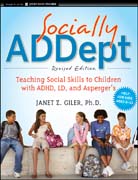
Socially ADDept: teaching social skills to children with ADHD, LD, and Asperger's
Giler, Janet Z.
INDICE: About This Book. About the Author. Acknowledgments. Introduction. Part I: What Parents and Teachers Need to Know. Chapter 1: Why Children with Special Needs Struggle Socially. Why Teach Social Skills? Language Difficulties and the Hidden Rules of Conversation. Difficulty Recognizing and Labeling Feelings. Poor Problem-Solving Skills. Failure to Mimic Behavior. How Children Deal with 'Different' Behavior. Why Train Preadolescent Children? Two Major Weaknesses That Lead to Social Mistakes. Black-or-White Thinking. Teaching Childrenwith SN the Behaviors of Popular Children. The Importance of Early Intervention. Teaching Joint Attention. Two Major Deficits. Ten Essential Skills for Being Socially ADDept. Notes. Chapter 2: Tips for Communicating with Children. Coaching Children on Desirable Behaviors. Role-Playing the Right Way Versus the Wrong Way. Empathy: Being in the Other Person's Shoes. Using Humor. Observing and Dealing with Perseveration. Recess. Monitoring Play. Using Opportunistic Reinforcement. Chapter 3: Setting Individual Goals and Giving Structured Feedback. Building Skills Teaches Resiliency. Helping Children Set Their Goals. Creating an Individual Program for Each Child. Using the Self-Evaluation Forms. Using the Self-Evaluation Form to Confirm Joint Perception. The Parent's Role asFacilitator. The Teacher's Role as Facilitator. Parents and Teachers Working Together. Rewarding Progress. Correcting Omissions or Inappropriate Behaviors.Self-Evaluation Form: Listening. Self-Evaluation Form: Showing Interest. Self-Evaluation Form: Paying Attention to Stop Signs. Self-Evaluation Form: Controlling Talking Too Much. Self-Evaluation Form: Being a Good Host. Charting Negative Behavior. Charting Positive Behavior. Notes. Chapter 4: Ways Parents Can Help. Helping Your Child Find and Excel in an Activity. Preparing for Social Situations. Using Discipline During a Play Date. Preparing Children for New Situations. Teaching Manners. Building Physical Coordination. Helping Children Learn About Time. Using Humor Appropriately. Finding a Social Skills Group. Meeting Other Parents. Getting Help for Yourself. Part II: The Socially ADDept Lessons. Lesson One: Friendship Skills and Setting Goals. 1.1 What Makes a Friend? 1.2 What Do Friendly People Do? 1.3 Ten Friendship Skills. 1.4 Defining Personal Goals. 1.5 Defining Positive Qualities. 1.6 Identifying Childrens SpecialInterests. Exercise 1: What Do Friendly People Do? Exercise 2: Defining My Personal Goals. Exercise 3: Tooting Your Own Horn. Exercise 4: Private or PublicTalk? Exercise 5: Identify Your Interests. Exercise 6: Friendship Cards: Keepa Record of Facts About Your Friends. Exercise 7: Good Host Rules. Exercise 8: Finding Neighborhood Activities: The Parent's Job. Lesson Two: Being a Good Listener and Other Conversational Skills. 2.1
- ISBN: 978-0-470-59683-8
- Editorial: John Wiley & Sons
- Encuadernacion: Rústica
- Páginas: 224
- Fecha Publicación: 28/12/2010
- Nº Volúmenes: 1
- Idioma: Inglés
